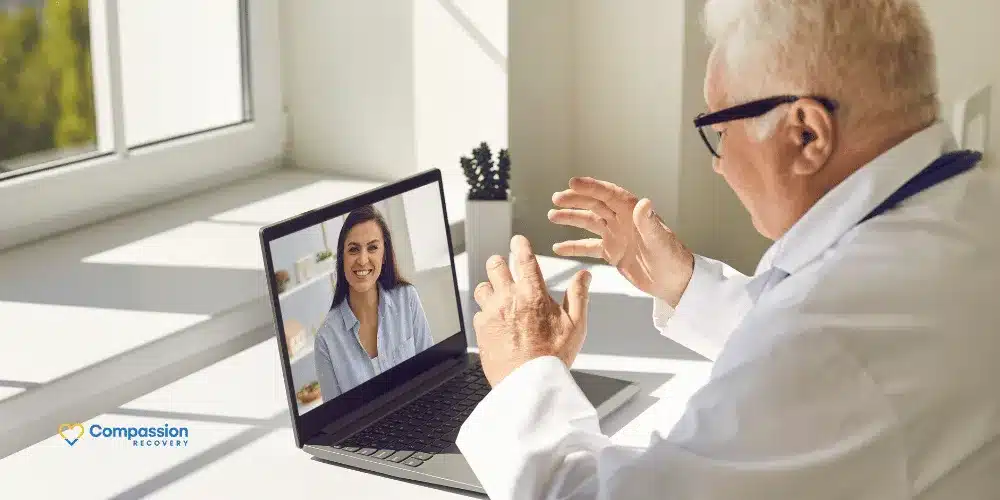Introduction to Adult Virtual IOP
An Adult Virtual IOP is one of the fastest-growing options in modern mental health treatment. It offers structured therapy and treatment programs for patients who need consistent care without stepping into residential care. Instead of traveling to a treatment center, patients connect through secure platforms, meeting with a clinician or mental health professional multiple times each week.
These virtual intensive outpatient (IOP programs) have been shown to be just as effective as traditional care for conditions such as major depressive disorder, anxiety disorder, bipolar disorder, and addiction. They also allow patients to balance therapy with work, school, and family responsibilities — something many young adult and adult patients find essential.

What Is an Adult Virtual IOP?
An Adult IOP is an outpatient program offering intensive therapy several days per week. A virtual IOP program delivers this care entirely online through encrypted video platforms, giving patients access to therapy, peer support, and psychiatry while remaining in their own homes.
Key Features of Online IOP
- Multiple therapy sessions weekly, typically three to five days
- Access to psychiatrists for medication management
- Group and individual therapy with a licensed mental health professional
- Secure patient portal for scheduling, learning, and resources
- Family therapy options that involve loved ones in recovery
- Confidentiality safeguards built into every aspect of treatment
Because technology allows patients to join from anywhere, these programs are increasingly available in Illinois, California, Colorado, Maryland, Arizona, and across the U.S.
Expert Oversight at Compassion Recovery Centers
One concern patients often have with virtual programs is whether they receive the same level of clinical expertise as in-person care. At Compassion Recovery Centers, treatment is supervised and reviewed by two leading clinicians:
- Dr. Marco M. Zahedi, Medical Director, oversees psychiatry, medication management, and the integration of behavioral therapies. His work focuses on mood disorder and dual diagnosis patients.
- Dr. Michael Majeski, a Licensed Psychologist (LP), brings years of expertise in therapy for anxiety disorder, borderline personality disorder, and schizophrenia.
Their direct involvement ensures treatment programs meet clinical standards, and every patient receives individualized care. This approach also improves patient satisfaction, providing reassurance that virtual treatment is grounded in science, not convenience.

Conditions Treated in Virtual IOP Programs
Virtual IOPs are not “one-size-fits-all.” They address a wide range of mental health conditions and dual diagnosis challenges.
Mood and Anxiety Disorders
Patients with major depressive disorder, generalized anxiety disorder, panic disorder, and social anxiety benefit from therapies that reduce symptoms and teach new coping strategies. These programs use exposure therapy and CBT to help patients regain control of their mind and emotion.
Bipolar and Personality Disorders
Bipolar disorder, borderline personality disorder, and other personality disorders require highly structured therapy. IOPs often use dialectical behavior therapy (DBT) and cognitive behavioral therapy to stabilize mood, reduce impulsivity, and improve relationships.
Dual Diagnosis and Addiction
For patients dealing with both addiction and a psychiatric disorder, dual diagnosis treatment is essential. Without treating both conditions, relapse risk remains high. Compassion Recovery’s programs integrate addiction counseling with psychiatric care.
Psychotic and Developmental Disorders
Patients with schizophrenia, psychosis, or attention deficit hyperactivity disorder (ADHD) often require medication and skills training. Virtual IOPs provide psychiatry oversight while teaching life skills that help patients manage daily stress.
Therapies Used in Adult Virtual IOP
Evidence-based therapy is the foundation of every outpatient program.
Dialectical Behavior Therapy (DBT)
DBT focuses on building emotional regulation, distress tolerance, and interpersonal effectiveness. It is particularly effective for borderline personality disorder and mood instability.
Exposure Therapy
Patients with anxiety disorder, panic disorder, or social anxiety benefit from gradual exposure to fears in a safe environment, reducing avoidance behaviors.
Cognitive and Behavioral Approaches
Behavioral therapy helps patients reframe harmful thoughts and build healthier patterns. These therapies are especially effective in treating major depressive disorder and generalized anxiety disorder.
Peer Support and Group Therapy
Virtual groups provide empathy, insight, and accountability. Veterans, young adults, and patients managing addiction find strength in hearing from others with similar struggles.

The Role of the Mental Health Professional
Every IOP relies on a team of clinicians to support patients. Roles often include:
- Psychiatrists: Diagnose conditions, manage medication, and monitor side effects
- Clinicians and Therapists: Provide individual and group therapy
- Family Counselors: Help strengthen relationships at home
- Case Managers: Assist with Medicaid, insurance, and long-term planning
Patients benefit from an integrated approach where multiple professionals collaborate on one treatment plan.
Benefits of Adult Virtual IOP Programs
Why choose a virtual IOP instead of residential care or standard outpatient therapy?
Flexibility and Access
Patients can log in from home, making care accessible even in rural areas. This also helps individuals balancing education, work, and family.
Confidential and Secure
A patient portal ensures confidentiality. Sessions are protected with HIPAA-compliant technology, allowing open conversation without fear of breaches.
Evidence-Based Curriculum
Programs follow a structured curriculum that combines therapy, life skills training, and relapse prevention.
Cost and Insurance
Many patients use Medicaid or private health insurance to access IOP care. Virtual treatment often costs less than residential care while still offering intensive support.
Who Benefits Most from Virtual IOP Programs?
Adults and Young Adults
Young adults learn coping and independence skills, while adults focus on managing long-term mental health conditions and relapse prevention.
Veterans and Families
Veterans often face post-traumatic stress, anxiety disorder, and dual diagnosis challenges. Family therapy provides loved ones with education, coping tools, and support.
Gender and Gender Identity Inclusivity
Treatment programs are designed to respect gender identity and create safe, inclusive environments where all patients feel supported.
Comparing Virtual IOPs to Other Treatment Options
| Program Type | Intensity | Location | Focus | Ideal For |
|---|---|---|---|---|
| Residential Care | 24/7 | In-person | Crisis stabilization, relapse prevention | Severe cases |
| Virtual PHP | 5–6 days/week | Online | Structured therapy, psychiatry | High-acuity patients |
| Adult Virtual IOP | 3–5 days/week | Online | Therapy, coping, peer support | Adults needing structured care |
| Outpatient Program | 1 day/week | Online/In-person | Maintenance, follow-up | Mild conditions |
How Confidentiality and Patient Portals Build Trust
Confidentiality is essential for all patients. Virtual care uses HIPAA-compliant systems and a patient portal where patients can:
- Access therapy schedules and treatment information
- Communicate directly with clinicians
- Track progress and educational resources
- Maintain confidentiality and insight into their recovery journey
Life Skills and Coping Education
Recovery extends beyond therapy sessions. Life skills are crucial in preventing relapse and managing stress.
Examples of Skills Taught
- Stress management through mindfulness and exercise
- Emotional regulation for mood disorder patients
- Social skills for those with social anxiety or personality disorder
- Relapse prevention techniques for addiction recovery
These skills help patients move forward with confidence in both personal and professional life.
Research and Patient Outcomes (2024–2025 Insights)
The latest research highlights the effectiveness of virtual IOP programs:
- 2024 Psychiatric Services Study: Patients in virtual IOP for anxiety disorder and major depressive disorder had outcomes equal to in-person IOPs.
- 2025 Digital Mental Health Review: Virtual IOPs and virtual PHP programs led to higher patient satisfaction scores than in-person care, largely due to flexibility and confidentiality.
- 2025 Dual Diagnosis Research: Patients with both addiction and mood disorder experienced 20% fewer relapses in virtual care compared to standard outpatient.
- Schizophrenia-focused 2025 Study: Virtual therapy combined with medication reduced hospitalization rates by 15% compared to traditional outpatient programs.
These findings suggest virtual programs are not a secondary option, but in many cases, the preferred choice for patients seeking accessible, evidence-based treatment.
Patient Journey Example
Consider a patient diagnosed with bipolar disorder and addiction. Traditionally, they may have needed residential care, but with a virtual IOP:
- They meet daily with a clinician and join peer support groups.
- Their psychiatrist monitors medication remotely.
- Family sessions help improve communication and reduce stress at home.
- Skills training prepares them for long-term relapse prevention.
After three months, this patient shows improved stability, better coping with stress, and reduced suicidal ideation. This example illustrates how virtual care delivers practical results.
The Role of Empathy and Support
Empathy is the foundation of recovery. Patients who feel understood are more likely to engage in treatment. Peer support and group sessions create community, reducing isolation and encouraging progress.
Compassion Recovery Centers integrates family, teens transitioning to adulthood, and veterans into treatment, reinforcing that mental health is not managed alone.
Education and Learning in Virtual IOPs
Education empowers patients. Compassion Recovery Centers provides structured learning opportunities through the patient portal and therapy sessions. Patients gain information on:
- Warning signs of relapse
- Medication side effects
- Stress and anxiety management techniques
- Building healthy relationships
This focus on education leads to long-term stability.
The Role of Technology in Treatment
Technology enables virtual programs to succeed. Secure video, encrypted messaging, and digital scheduling tools allow for flexibility and privacy.
Technology also supports outreach and marketing, ensuring patients in Illinois, Maryland, Colorado, and Arizona can discover programs online.
Access to Care Across States
Compassion Recovery Centers serves multiple states, ensuring patients in underserved areas can access care without moving. For patients with limited local outpatient services, virtual treatment eliminates barriers and promotes equity in health care.
Conclusion: Choosing the Right Virtual IOP
An Adult Virtual IOP combines therapy, coping education, peer support, and medication management into one accessible package. It addresses mental health conditions such as major depressive disorder, bipolar disorder, schizophrenia, borderline personality disorder, and addiction.
With expert oversight from Dr. Marco M. Zahedi and Dr. Michael Majeski, Compassion Recovery Centers ensures programs remain clinically accurate, evidence-based, and patient-centered. Supported by 2024–2025 research, virtual care is now a trusted, effective solution for adults seeking recovery and stability.
Medically Reviewed By
This article has been medically reviewed by:
- Dr. Marco M. Zahedi – Medical Director, Compassion Recovery Center
- Dr. Michael Majeski – Licensed Psychologist (LP), Compassion Recovery Center